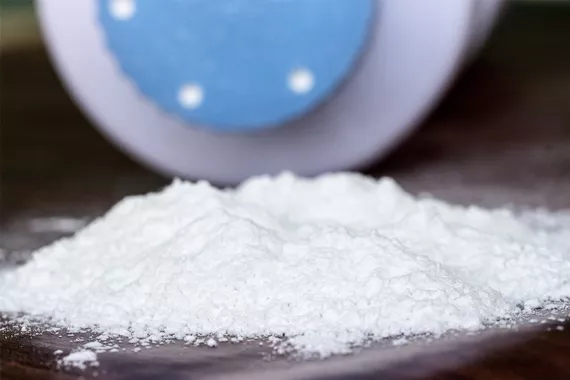
Case Overview
For decades, consumers have used talcum powder products as part of their daily hygiene regime. While using the products to keep their skin dry and avoid rashes, the product may have harmed their health. More than 50 years of research allegedly links the use of products containing talc to talcum powder cancers, like ovarian cancer. Today, tens of thousands of users of talc products have filed lawsuits after being diagnosed with talc-related cancer.
Key takeaways about talcum powder and cancer
- Talcum powder is a common personal care product used by women to prevent rashes and dry the skin. It’s often applied directly on the genitals or onto sanitary napkins.
- Plaintiffs allege strong clinical evidence links talc use to female reproductive cancers, including ovarian cancer. At least 28 studies have linked long-term use of talcum powder to ovarian cancer, with at least three studies showing an increased risk of 149% or more.
- If you’ve been diagnosed with cancer you believe to be related to the use of talc-based products, seek medical treatment and consider filing a talcum powder lawsuit.
What is talcum powder?
Talcum powder is a fine white powder made from talc, a naturally occurring mineral. Talc is a magnesium trisilicate that is mined from the earth. Talc is a common substance found in talcum powder, talc-based baby powder, cosmetic products, and many other items.
As a powder, talc can absorb moisture and reduce friction, making talcum powder ideal for consumers looking for a solution to prevent rashes. Many women apply talcum powder products directly on the genitals and perineal area or onto sanitary napkins. Talcum powder has a long history of also being used as baby powder to prevent diaper chafing.
Several studies link the use of talcum powder to multiple cancer risks, including an increased risk of ovarian cancer.
Does talc cause cancer?
Plaintiffs allege there is strong clinical evidence that links talcum powder use to ovarian cancer. Decades of studies have shown an increased risk of ovarian cancer for women who used talcum powder products, like Johnson & Johnson’s Baby Powder. The following studies found a connection between talcum powder and cancer:
- 1982: In one study, researchers found a 92% increased risk of ovarian cancer in women who used talc powder in the genital area. Since then, 27 additional studies have associated talc with increased ovarian cancer risk. At least three studies showed an increased risk of 149% or more.
- 1992: A study found a 379% increased risk of ovarian cancer in women who applied talc to sanitary napkins before placing them next to their genital areas.
- 1993: Some talc products sold to consumers may include asbestos, a widely known carcinogen. However, in 1993, the U.S. National Toxicology Program published a study that found clear evidence of cancer-causing risks even in the non-asbestos form of talc.
- 2016: More recently, a 2016 study included 2,041 individuals diagnosed with epithelial ovarian cancer, a type of ovarian cancer that begins in the cells on the surface of the ovary. The study also included a control group of 2,100 individuals who hadn’t been diagnosed with epithelial ovarian cancer. Researchers found that women who used talc in the genital area had a 33% higher risk of developing ovarian cancer. The study also found that the longer a woman used talc in the genital area, the higher her risk. Most women in the study reported using Johnson & Johnson’s Baby Powder and Shower to Shower products.
Other studies suggest links between talcum powder use and illnesses such as stomach cancer and pleural mesothelioma (cancer of the lining that surrounds the lungs). However, additional research is needed to further study these potential associations.
Does baby powder cause cancer?
Baby powder that contains talc may cause cancer. Multiple studies have provided data showing an association between perineal talc use and an increased risk of ovarian cancer. The studied risk is highest when talcum powder is applied to the genitals and used over a prolonged period of time.
The American Academy of Pediatrics has also advised against using talcum powders because they pose an inhalation risk. To treat diaper rash, parents can use an ointment that contains petroleum. Cornstarch, which has no known health effects, is also an option for chafing. Anti-chafe and sweat-wicking clothing are options for those who want to avoid lubricants or ointments.
Baby powder cancer symptoms
Cancer symptoms linked to baby powder can vary depending on the type and location of the cancer. One of the most common cancers linked to the genital use of talcum powder over an extended period of time is ovarian cancer.
Symptoms of ovarian cancer include:
- Abnormal vaginal discharge or bleeding after menopause
- Bloating or swollen feeling in the stomach
- Changes in bowel movements
- Discomfort or pain in the pelvic area, abdomen or lower back
- Fatigue
- Feeling full immediately after eating
- New constipation
- Unexplained weight loss
Ovarian cancer is often difficult to detect early because many of the symptoms listed above can mimic other common conditions. If you experience any of these symptoms, it’s important to consult your doctor.
Key takeaways about ovarian cancer
- Symptoms of ovarian cancer can vary, but may include: abnormal vaginal discharge, bloating, changes in bowel movements and constipation.
- Treatment options for ovarian cancer include surgery, chemotherapy, hormone therapy, targeted therapy and/or immunotherapy.
- After an ovarian cancer diagnosis, consult medical professionals to develop a treatment plan. After that, you can consult with a lawyer about whether you can file a lawsuit to seek compensation for your talcum powder-related injuries.
How do you treat ovarian cancer?
An oncology specialist will develop an individualized treatment plan for your type of cancer and its current stage. Treatment options include:
- Chemotherapy (intravenously, orally or through an abdominal port)
- Hormone therapy that blocks or lowers estrogen levels
- Immunotherapy that enhances the body’s immune system to kill cancer cells
- Surgery (hysterectomy, removal of fallopian tubes and ovaries, lymph node removal)
- Targeted therapy through drugs
What do I do if I believe my cancer diagnosis is related to my use of baby powder?
If you've been diagnosed with cancer and believe it is related to your use of baby powder, consult medical professionals right away to develop a treatment plan.
Once you are medically able to pursue legal recourse, you may want to speak with a lawyer about whether you may be eligible to file a talcum powder lawsuit. Currently, more than 58,000 talc cases are pending in federal court against talcum powder manufacturers such as Johnson & Johnson. Plaintiffs in these cases are seeking compensatory damages after developing serious health conditions like ovarian cancer after using talc-containing products.
Cases filed in federal district courts have been coordinated before a single judge into a single action called a multidistrict litigation (MDL). This MDL is designed to makes it more efficient for the court to handle the high volume of claimants in the talc powder lawsuits.
If you contact us to learn more about talc cases, we’ll schedule a consultation to evaluate your legal options. If eligible, our team will collect all relevant documentation and help you file a lawsuit against talcum powder product manufacturers such as Johnson & Johnson.
Our toxic exposure experience
Motley Rice attorneys have extensive experience seeking justice for women diagnosed with ovarian cancer and other serious health conditions after using allegedly defective products, many of which are still available to the public.
Our law firm has advocated for women and their family members to hold companies accountable for negligence, defective products and the devastating impacts on the lives of those affected by their harmful practices.
Our litigation experience includes representing women who:
- Experienced serious health effects after using birth control products like Essure® and Paragard
- Were diagnosed with reproductive cancers after using chemical hair relaxers
- Experienced life-threatening complications because of their breast implants
Key takeaways about talcum powder and cancer
What is talcum powder?
Does talc cause cancer?
Baby powder cancer symptoms
Key takeaways about ovarian cancer
Our toxic exposure experience
- Sources
- American Cancer Society. Talcum Powder and Cancer.
- Cleveland Clinic. Epithelial Ovarian Cancer.
- Commonwealth of Massachusetts. Talc in Cosmetics and Consumer Products.
- Johns Hopkins Medicine. Ovarian Cancer.
- Judicial Panel on Multidistrict Litigation. Pending MDLs.
Start Your Motley Rice Consultation in Simple Steps
Submit Information
Call us or fill out our online form with the details of your potential case.
Case Review
Our team reviews your information to assess your potential case.
Case Consultation
Talk with us about next steps.


